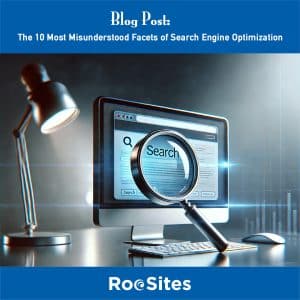 In the world of web design, development, and digital marketing, promises are easy to make. “We’ll get you found in search.” “We build fast, high-performing websites.” “We know what Google wants.”
In the world of web design, development, and digital marketing, promises are easy to make. “We’ll get you found in search.” “We build fast, high-performing websites.” “We know what Google wants.”
But here’s the question most businesses forget to ask:
If a company can’t do it for themselves, how can they do it for you?
It’s surprisingly common to see agencies selling big ideas while their own websites tell a very different story: slow load times, poor search visibility, outdated design, weak content, and little to no online authority.
Yet they confidently pitch strategies they haven’t successfully executed in their own digital presence.
That disconnect matters. A website isn’t just a sales tool—it’s proof.
At RooSites Web Development, our philosophy is simple:
If we promise it, we’ve already done it ourselves.
We don’t sell theory. We sell experience—earned through real results, tested on our own platform, and shared directly with our clients.
We don’t just talk about SEO—we live it. Our website is built to compete in real search results, using proven site structure, content strategy, and technical execution. The same methods we apply to RooSites are the methods we apply to our clients.
Speed, stability, and user experience aren’t buzzwords to us. We continually optimize our own website for mobile usability, Core Web Vitals, and real-world performance—because if it doesn’t work for us, it won’t work for you.
From search results to local listings to brand credibility signals, our digital footprint reflects exactly what we help clients build: authority, consistency, and trust.
Many companies disappear after launch. We don’t. Our own site is constantly evolving—just like the sites we manage for our clients. Updates, improvements, and refinements are part of our everyday process.
When clients work with RooSites, they can see the roadmap in action—on our own website.
Your website is often the first impression of your brand. It needs to load quickly, work beautifully on mobile, be easy to navigate, and show up when people search for what you do—consistently.
Partnering with a company that practices what it preaches means you’re not funding experiments. You’re investing in strategies that already work.
We don’t believe in selling potential. We believe in sharing success.
If you want a web partner whose promises are backed by real achievements—visible, measurable, and ongoing—we’d love to talk.
Because your success shouldn’t be based on claims. It should be built on proof.
RooSites Web Development, LLC is an award-winning web design, development, and management company with offices in Boston & Foxboro, Massachusetts and Dunedin, Florida.
If your website isn’t ranking, loading fast, or representing your business the way it should, contact RooSites today and let’s build something that performs.

One of the biggest misconceptions about SEO is that it’s a one-and-done task. In reality, SEO is an ongoing process that requires constant monitoring, tweaking, and updating. Search engines frequently change their algorithms, and what works today might not work tomorrow. Continuous effort is necessary to maintain and improve rankings.
In the early days of SEO, stuffing as many keywords as possible into your content was a popular tactic. However, search engines have become much more sophisticated. Today, keyword stuffing can hurt your rankings as search engines prioritize user experience and relevance over keyword density.
While backlinks are crucial for SEO, not all backlinks are created equal. The quality of the backlinks matters more than the quantity. Links from reputable, high-authority sites are beneficial, whereas links from spammy or irrelevant sites can damage your SEO efforts.
SEO is often seen as a quick fix for traffic and rankings, but in reality, it’s a long-term strategy. It can take several months to see significant results from your SEO efforts. Patience and persistence are key to a successful SEO campaign.
Many believe that Search Engine Optimization is solely about getting to the top of search engine results. While high rankings are important, the ultimate goal of SEO is to drive relevant traffic that converts into leads or sales. User experience, website speed, and mobile-friendliness are all critical aspects of a successful SEO strategy.
Another common misconception is that investing in paid ads, such as Google Ads, will directly boost your organic rankings. Organic SEO and paid search are two separate entities. While both are essential for a well-rounded digital strategy, paying for ads won’t improve your organic rankings.
With the rise of advanced SEO techniques, some believe that meta tags are no longer important. While meta tags alone won’t guarantee top rankings, they still play a vital role in helping search engines understand your content and improving click-through rates.
There’s a belief that social media activity directly impacts SEO rankings. While social media can drive traffic to your site and enhance brand visibility, there’s no direct correlation between social signals and search engine rankings. However, the indirect benefits of increased traffic and engagement should not be overlooked.
Content is a significant part of SEO, but it’s not the only factor. Technical aspects like site architecture, page speed, mobile optimization, and security (HTTPS) are also crucial for effective SEO. A well-rounded approach that combines quality content with solid technical SEO is essential.
Search Engine Optimization is often underestimated, with some believing it can be done quickly without much expertise. However, SEO is complex and ever-evolving, requiring a deep understanding of both technical and creative elements. Hiring an experienced SEO professional or agency can make a significant difference in achieving your goals.
Understanding the nuances of Search Engine Optimization (SEO) is vital for anyone looking to improve their website’s visibility and performance. Avoiding these common misconceptions can save you time, money, and frustration, and help you develop a more effective SEO strategy that drives real results. Remember, SEO is a marathon, not a sprint—commit to the long game, and your efforts will pay off.
Related Content: 20 Effective Strategies to Boost Your Search Engine Rankings